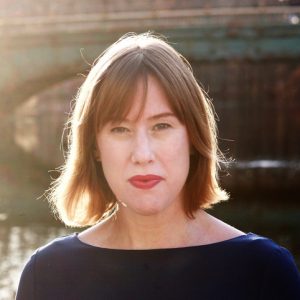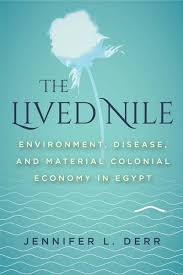Faculty Profile: Jennifer Derr, Associate Professor of History

Jennifer Derr is an Associate Professor of History at UC Santa Cruz, and the founding director of the Center for the Middle East and North Africa, a new THI-incubated Research Center. We spoke to Derr about her background in the region, her plans for the new Center, and its public programming.
The Humanities Institute’s upcoming event, Questions that Matter, on February 4th, 2020, is the kickoff for the Center. The evening features Derr in conversation with two NPR journalists–Hannah Allam and Leila Fadel. Get your tickets in advance.
Congratulations on your appointment as the director of the new Center for the Middle East and North Africa (MENA) at UC Santa Cruz! The Center focuses on the culture, history, and politics of the region, and will bring together international scholars, artists, and policymakers for a variety of different events—the first of which is a THI signature event, Questions that Matter, on February 4th, 2020: “Reporting the Middle East.” Can you tell us what the audience might expect from this event? What questions, topics, and themes do you hope the evening will explore?
 Many people in our community here in Santa Cruz are exposed to events in the Middle East and North Africa through the work of journalists. The journalists who will headline our inaugural event, Leila Fadel and Hannah Allam, have done what I consider some of the best reporting on the region. It is our good fortune that they are now reporting from the U.S. on topics that are central to our national politics. Our conversation on February 4th will concern the work of journalism in the Middle East and in the United States. Fadel and Allam reported from Iraq during the American occupation; they were also on the ground for the Arab Spring and the return to authoritarianism and violence that some countries in the region experienced with the failure of those uprisings. Our conversation will address what it was like to do journalism during those historic moments and how the surrounding conditions changed how journalists report the Middle East. Since their return to the U.S., Fadel and Allam have, among other topics, reported on questions of race, culture, domestic extremism, and violence. Fadel was on the ground for the aftermath of the Las Vegas shooting in 2017. Allam has reported on Muslim communities in the United States. We’ll discuss what it’s like to investigate the issues at the center of American politics, especially during a moment when some Americans distrust the media.
Many people in our community here in Santa Cruz are exposed to events in the Middle East and North Africa through the work of journalists. The journalists who will headline our inaugural event, Leila Fadel and Hannah Allam, have done what I consider some of the best reporting on the region. It is our good fortune that they are now reporting from the U.S. on topics that are central to our national politics. Our conversation on February 4th will concern the work of journalism in the Middle East and in the United States. Fadel and Allam reported from Iraq during the American occupation; they were also on the ground for the Arab Spring and the return to authoritarianism and violence that some countries in the region experienced with the failure of those uprisings. Our conversation will address what it was like to do journalism during those historic moments and how the surrounding conditions changed how journalists report the Middle East. Since their return to the U.S., Fadel and Allam have, among other topics, reported on questions of race, culture, domestic extremism, and violence. Fadel was on the ground for the aftermath of the Las Vegas shooting in 2017. Allam has reported on Muslim communities in the United States. We’ll discuss what it’s like to investigate the issues at the center of American politics, especially during a moment when some Americans distrust the media.
Your own research as an Associate Professor of History at UC Santa Cruz is in the “contemporary history” of the modern Middle East. Can you tell us more: what areas and research questions do you cover, and what is your own background—academic, research-wise, and perhaps personal interest-wise—in terms of the Middle East?
One of the reasons that I love teaching is because my own trajectory took a sharp turn when I was an undergraduate and in the short years that followed my graduation. Since that period, I’ve spent more than a decade living in the Middle East. My scholarly research builds on these early experiences.
My interest and experience in the Middle East began in college. One of the reasons that I love teaching is because my own trajectory took a sharp turn when I was an undergraduate and in the short years that followed my graduation. Since that period, I’ve spent more than a decade living in the Middle East. My scholarly research builds on these early experiences. It lies at the intersection of the histories of science, medicine, and the environment in the modern Middle East.
I recently published a book, The Lived Nile: Environment, disease, and material colonial economy in Egypt, that explores the multi-faceted impacts of damming the Nile River during the nineteenth and twentieth centuries. The book is specifically concerned with how environmental transformation and interactions with the material environment helped to shape the minds and bodies of historical subjects; those subjects included laborers, cultivators, engineers, physicians, and colonial capitalists. The book argues that the histories of political economy are environmental histories, and environmental histories, bodily histories. One of the effects of the transformation of the Nile River was an epidemic of liver disease that Egyptians suffered during the twentieth century. I am currently researching a book about this epidemic and what it reveals about the history of the field of tropical medicine as it was practiced in the global south in the second half of the twentieth century. Egyptian physicians and scientists are important actors in the story that I am discovering.
Can you let us know what else the Center has planned in the upcoming months, in terms of public engagement?
The Center is working with different groups on campus to program events. To our good fortune, these groups have also taken the initiative and planned their own programming concerning the Middle East and North Africa. On March 4th, the Institute of Arts and Sciences is bringing the Lebanese media artist Walid Raad to campus. We are partnering with the Film and Digital Media Department and THI’s Body, (Anti)Narrative, and Corporeal Creative Practices Research Cluster to bring the Iranian filmmaker Mania Akbari to campus on February 24th. We are also co-sponsoring speakers with the Politics Department. Finally, the Center for Jewish Studies has organized a number of exciting events this year concerning North Africa, including a screening of the film “Free Men” on February 12th, co-presented with THI, and a lecture on March 3rd by Aoumar Boum on the French labor camps on the Saharan Frontier during WWII. Stay tuned for more details.
I think it’s important to emphasize that the Center for the Middle East and North Africa at UC Santa Cruz is truly unique among centers focusing on the region.
You’ve noted the importance of undergraduates and graduates to the Center’s work. How do you anticipate students being involved in the Center?
I hope that students become involved with all aspects of the Center’s work. Establishing this Center is a tremendous opportunity to create a richer and more diverse learning environment. One facet of this project will concern travel and study in the Middle East and North Africa. Professor Peter Limbrick is bringing a group of students to Morocco this summer to study Moroccan cinema, culture, and the Arabic language. Other study abroad trips to the region are in the planning stages. Graduate education is also an important part of our mission. I was recently awarded a CAREER grant from the National Science Foundation, a portion of which will support graduate students to do research on the histories of science and medicine in the post-colonial global south, the Middle East and North Africa in particular.
I am happy to report that we have begun to teach Arabic and Persian on campus, which has long been a demand of our students. These classes complement the Hebrew language classes that are taught through our Jewish Studies program. Finally, I hope that undergraduate and graduate students will always form a part of the audience at the events that we sponsor. As director of the Center, my goal is to build a community that consists of faculty, staff, students, and residents of Santa Cruz and the central coast who are interested in coming together to learn about and engage the Middle East and North Africa.
What do you think sets the Center apart from other initiatives of this kind?
We have a tremendous opportunity with the establishment of the Center for the Middle East and North Africa to build a wide-ranging intellectual community.
I think it’s important to emphasize that the Center for the Middle East and North Africa at UC Santa Cruz is truly unique among centers focusing on the region. The research interests of the faculty members who are associated with the center are diverse and wide-ranging, and include faculty in the Humanities, Social Sciences, and Arts Divisions. The research agendas of these different faculty members address questions of law, politics, the environment, science, art, culture, literature, and film. One of our primary strengths is the large number of faculty members at UC Santa Cruz whose research concerns North Africa. Second, for years, there have been calls from undergraduate and graduate students to expand our curriculum and program planning concerning the Middle East and North Africa. This Center and the Arabic and Persian language courses that we now offer is – in part – a response to their call. Finally, the center will look to engage people locally, in the communities that comprise California’s central coast. We have a tremendous opportunity with the establishment of the Center for the Middle East and North Africa to build a wide-ranging intellectual community.
Join The Humanities Institute and Jennifer Derr in asking the Questions that Matter on February 4th, 2020, at the Kuumbwa Jazz Center in downtown Santa Cruz.
On February 5th, 2020, UC Santa Cruz students have the opportunity to meet with NPR journalists Leila Fadel and Hannah Allam on campus: join us in Humanities 2, Room 259 at 3pm.
